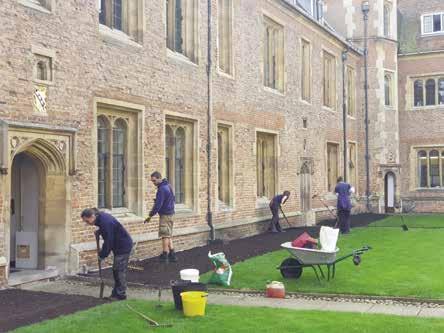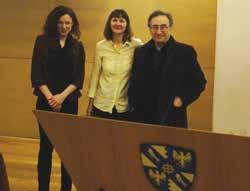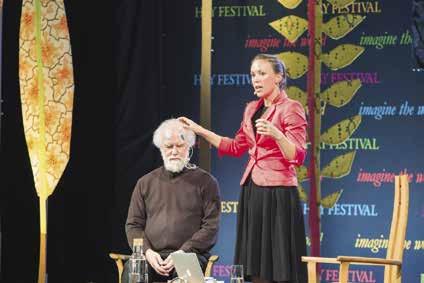
19 minute read
X Alumni and Development
1 REUNIONS A Reunion Dinner was held on 15 September 2017 for Members matriculating in the years 1986–1988, attended by 85 alumni, 11 Fellows, and staff. The speaker was Rt Hon Greg Clark (1986). A Reunion Dinner was held on 22 September 2017 for 1989–1991 Members. It was attended by 85 alumni, 9 Fellows, and staff. The speaker was Revd Dr Stephen Hampton (1990). A Reunion Dinner took place on 13 April 2018 for Members matriculating in the years 1992–1994. It was attended by 111 alumni, 7 Fellows, and staff. The speaker was Mr Amarjit Singh (1992). On 5 May 2018, a Reunion Lunch for Members matriculating in the years 1958–1964 welcomed 126 alumni and guests, 9 Fellows, and staff. The speaker was Mr Graham Eves (1964).
2 AWARDS AND ACHIEVEMENTS Sir Simon Bryan (1984): High Court Judge allocated to the Queen’s Bench
Advertisement
Division as a nominated judge of the Commercial Court A J Bull (1980): MBE for services to the development of public understanding in nuclear research, in the 2018 New Year’s Honours List P A L Causton (1989): shortlisted as solicitor of the year in the Law Society’s
Excellence Awards 2017 G J Craddock (1977): Chief Risk Officer of the Massachusetts Mutual Life
Company Wg Cdr J B Crawford (2003): OBE in the Queen’s 2015 Birthday Honours List Dr R Crellin (2006): Lectureship in Later Prehistory at the University of Leicester N A Dobrik (1978): MBE for services to people affected by thalidomide, in the
New Year’s Honours List M Don (1976): OBE in the Queen’s 2018 Birthday Honours List J R Eadie, QC (1980): awarded a Knighthood in the Queen’s 2018 Birthday
Honours List P L Elwood (2012): Boat Race 2018 Men’s Blue Boat winner V Evdokimento (2003): nominated for a BAFTA Dr J R J C Godwin (1962): Hon Fellow of the Society of Antiquaries of London R Harcourt (1959): Hon Fellow of the British Shakespeare Association Dr G C Hawtin (1967): OBE in the Queen’s 2017 Birthday Honours List for services to global agrobiodiversity conservation, subsistence livelihood enhancement and sustainable food programmes Sir Brian Ivory, CBE (1968): CVO in the Queen’s 2018 Birthday Honours List Eur ing Dr P Mann (1994): one of the Winners of Top 50 Women in Engineering
Award 2018 M Martschenko (2015): Boat Race 2018 Blue Boat winner
L J Moelwyn-Hughes (1989): appointed Master of Marlborough College from
August 2018 J A McPhee (1953): 1999 Pulitzer Prize for Annals of the Former World Dr J P B O’Connor (1992): Professor of Radiology at the University of
Manchester and Honorary Consultant Radiologist at the Christie NHS
Foundation Trust J S Partridge (1958): Freedom of the Worshipful Company of Stationers &
Newspapers Makers in July 2017 Sir Brian W Pomeroy, CBE (1962): Chairman of Age UK D A C Ryder, Earl of Harrowby (1974): Deputy Lieutenant (DL) of Staffordshire,
May 2017 Prof Dr E Wetter Slack (1999): Winner of the ETH Zurich Latsis Prize 2017 and
ETH Goldene Eule (outstanding teaching D-BOIL) 2016 Revd D J Weekes (1956): PhD from the University of St Andrews
3 SELECTED PUBLICATIONS (to 30 June 2018) *B Bland (2001): Generation HK: Seeing Identity in China’s Shadow (2017) *D K C Cooper (1972, formerly Fellow): Christiaan Barnard: The Surgeon Who
Dared (2017) *D Crawley (1999): (co-author): The People Equation: Why Innovation is people, not products (2017) with D P Piscione *A Crisp (1968): Colonel Belchamp’s Battlefield Tour (2017) *P Ford (1971) (co-author): Greens Annotated Acts: Charities and Trustee Investment (Scotland) Act 2005 (2nd Edn, 2017) with S Cross *I Gately: Rush Hour: How 500 Million Commuters survive the daily journey to work (2015) and The Secret Surfer (2018) A Ibrahim (2004): The Rohingyas: Inside Myanmar’s Hidden Genocide (2016) B Kloss (2005): The Exercise of Prosecutorial Discretion at the International Criminal
Court: Towards a more Principled Approach (2017) J A McPhee (1953): Draft No 4: On the Writing Process (2017) *R N A Maguire (1973) (trans): Napoleon’s Commentaries on the wars of Julius
Caesar (2018) *J Mole (1961): Gestures & Counterpoints (2017) C W R D Moseley (1985): Latitude North (2014) and Coming to Terms (2017) *D Robinson (Honorary Fellow): Stanley Spencer (1990) *G Shen (Yip Visiting Fellow 2016–17) (co-editor): Value Management in
Construction and Real Estate: Methodology and Applications (2016) with A Yu *B Staveley (1974): Faultless Grammar: the busy lawyer’s reminder guide (2017)
*We are grateful to these authors for presenting copies of their works to the College Library
4 MEMBERS’ DEATHS (to mid-July 2018) D Chapman (1944); C Hogben (1944); H C Cockerill (1945); J C Yandle (1945); The Revd J Y R Tucker (1947); J Palmer (1947); P J R Bathurst (1948); J W Drinkwater (1948); E D Ezra (1948); H A R Turner (1948); Dr D J Fairclough (1949); Sir Thomas A Beevor, Bt (1949); D A Bennet (1950); G V H Grimmett (1950); R D Hewlett (1950); H J Laurence (1951); J H Allsopp (1951); Dr J B Nichols (1951); H L B Newton (1952); A C F Thomson (1953); G A Pitman (1955); The Revd R J Dixon (1955); C G M Duncan (1955); R F Allen (1956); Major B Mollo, TD (1956); His Honour Judge E V P Reece (1956); J Shaw (1957); J M Escombe (1957); Revd J K Isaacs (1957); N McMillan (1958); J W Prince (1958); A Moger (1959); A J G Glossop (1959); J Clark (1960); Prof P H Ribbe (1960); R W Wright (1960); N Rogerson (1962); R L Preston (1962); M P Stanyer (1963); Dr D E Sparks (1964); Dr C J Bates (1967); P A Taylor (1969); Dr N S J F Bowen (1971); J Lello (1974); S J G Doggart (1979); H J Angell-James (1981); T Gooderham (1986); J M C Evans (2016).
Raymond R Sackler, KBE, Officier de la Légion d’Honneur, Officer in the Order of Orange Nassau (1995). Raymond Raphael Sackler was born in Brooklyn, New York City in 1920, and was a psychiatrist, pharmacist and philanthropist. He was educated at Erasmus Hall High School and New York University, then at Anderson College of Medicine in Glasgow and graduated from Middlesex University Medical School in Waltham, Mass in 1944. He was one of three brothers whose parents were Isaac, a Jewish emigre from Austria-Hungary, and Sophie, a refugee from Poland. They ran a small grocery business. All three brothers attended medical school and became psychiatrists and later very successful pharmacists who owned their large pharma company. They were conspicuous philanthropists in the USA, Israel and UK supporting the arts, medicine, and archaeology especially within the University of Cambridge, possibly because of the presence of Napp Laboratories. Magdalene was fortunate to benefit from generous financial support from Sackler and his wife, Beverly, and they were both made Honorary Members of the College in 1999. He died on 27 July 2017, aged 97, and is survived by his wife and their two sons, Richard and Jonathan.
David Derek Bourgeois, MusD, was born in Kingston upon Thames in 1941 and was educated at Cranleigh School, Surrey. Francis Turner (1920, Fellow and Tutor) secured his election to the Magdalene Music/Organ Scholarship in 1959. The Director of Music at Christ Church, Oxford, had rejected him, maintaining to Turner that ‘Bourgeois is no bloody good’ – to which Turner’s peremptory response was, ‘You’re wrong. I’m taking him’. You’ll see’. Turner was proved triumphantly right. Bourgeois obtained a First in the Music Tripos Part II in 1962; CUMS (under David Willcocks) performed his symphony N o 1 in G minor in 1961. Critically acclaimed, this brought him to public notice. In the following year he set to music a passage in T S Eliot’s ‘East Coker’ based on a text of St John of the Cross, and it was due to receive its premiere at the Arts Council in November 1962. On being informed of this, Eliot refused permission. The Master, Sir Henry Willink, with the support of the Fellows, pleaded with Eliot to reconsider. Persuaded that the performance would be a great honour for a student-composer ‘of exceptional promise’, Eliot gave his ‘very exceptional permission’ for this single performance only; but he insisted that the passage was ‘not at all suitable’, and ‘not one of the parts which I would normally allow a composer to make use of’.
After completing the Cambridge MusB degree and then two further years at the Royal College of Music, studying composition under Herbert Howells and conducting under Sir Adrian Boult, Bourgeois returned to his old school to teach, and launched his career as a composer. This soon led to the award of the extremely rare substantive Cambridge degree of Doctor of Music (1971), only the second Magdalene man to achieve this (the first was Thomas Busby in 1801). He was a Lecturer in Music at Bristol University, 1970–1984, Musical Director of the National Youth Orchestra, 1984–1993 (and hugely appreciated), and finally Director of Music at St Paul’s Girls’ School (in succession to Holst and Howells), 1993–2002. In an output of imaginative variety, he became best known for his outstanding brass and wind-band pieces, and works for school performance. His own instrument was the tuba, for which he composed a concerto, and there were others for the trombone and the euphonium. His musical style was strongly influenced by Britten, Walton, Strauss, and Shostakovich. Always accessible and atmospheric, and often witty, his music has been described as ‘unfashionably melodic’; it reached a wider audience with his music for TV’s ‘Barchester Chronicles’ (1981) and ‘Mansfield Park’ (1983).
He developed into a ‘prodigious symphonist’, completing a stream of 116 symphonies, almost all of them in retirement since 2002, when he was mainly house-bound because of his wife’s disabling illness. This recordbreaking number is far and away larger than any British composer has ever achieved. (Haydn wrote 104.) He died on 6 September 2017, aged 75. His first wife, the violinist Jean Bourgeois, died in 2006 and he is survived by Norma, his second wife. R H
The Right Revd R M C Beak, OBE (1943). Robert Michael Cawthorn Beak, was born in 1925. At school he joined the Air Training Corps and was instructed by Laurence Olivier and Ralph Richardson. He read Geography at Cambridge but was called up in 1944 and became a Dekota reconnaissance missions pilot over Burma. As a child his faith had been nurtured through Crusader classes and rather than return to Cambridge he attended the London Bible College, Tyndale Hall and Wycliffe Hall. He became a curate at St. John’s, Tunbridge Wells. He held posts in Uganda and Kenya before returning briefly to the West Country. He returned to Kenya to become Assistant Bishop in Marsabit, an area of North Kenya, from 1984 to 1989, and later Hon. Assistant Bishop in Derby diocese. His first wife Eileen Forbes died in 1956. In 1987, he married Peggy Daynes who died in 2016. He died on 13 January 2018, aged 92. He is survived by his children, Liz, Gil, David, and Steve from his first marriage.
Sir Julian Loyd, KCVO, DL(1950). Julian St John Loyd was born in 1926 and was educated at Eton School and Magdalene College. He left Eton to join the Coldstream Guards, but his short career was ended by illness. He went to Magdalene to study Land Economy before joining Savills in Norwich where he was a partner until 1964. He left to become the Queen’s Land Agent at Sandringham. During his 27 years in the role he was responsible for modernising access and facilities including a caravan park and housing for estate staff. He was knighted in 1971 and served as Deputy Lord Lieutenant of Norfolk. He died on 7 February 2018, aged 91. He is survived by his wife, Mary, their four children, Alexandra, Charles, and Mary Rose, and six grandchildren.
Sherban G Cantacuzino, CBE (1947). Sherban Cantacuzino was born in Paris in 1928 of Romanian parents and was educated at Winchester College and at Magdalene where he read Architecture. He was an architect, conservationist and teacher. He was the author of several seminal books on architecture and Secretary of the Royal Fine Arts Commission. He campaigned to prevent the gold miners destroying Rosia Montana Mountain in Romania and he was the founder and president of Pro Patrimonio, The National Trust of Romania. He died on 19 February 2018, aged 89. He is survived by his wife, Anne, their daughters Ilinca and Marina, and five grandchildren.
Professor Lionel March, ScD (1956) was born in Hove in 1934. It was on the recommendation of Alan Turing to his fellow mathematician, Dennis Babbage, the Senior Tutor, that March was accepted to read mathematics at Magdalene. Turing had been greatly impressed by the schoolboy’s paper on ‘n’ dimensional numbers. But two years’ national service had dimmed the mathematical spark and March spent most of his first year designing stage sets for the ADC, the Arts Theatre and Sadler’s Wells. Threatened with being sent down, he transferred to architecture under the newly-appointed first Professor, Sir Leslie Martin. Continuing his stage design and ignoring the requirement to keep nights in term, he would return from work at Sadler’s Wells so exhausted that his supervisor, David Wyn Roberts, would wake him up for supervisions. He failed the final examination but, resitting, was awarded a First. Two years later, completing the diploma, Martin gave March the job of designing the University’s 1962 plan for Cambridge. Awarded a Harkness fellowship, he spent a year at the Harvard/MIT Joint Center for Urban Studies before being summoned back by Martin to design the Whitehall Study of 1964. It was while working on this that March developed his theory of the relationship of building form to density – demonstrating that high towers are not necessary to save land. Influential at the time and then forgotten, this finding is, in today’s post-Grenfell world, more relevant than ever. In later life, he joked that there is a major but invisible monument to him and Martin in Whitehall,
where there are still no towers. In 1969 Martin and March established the Centre for Land Use and Built Form studies (now the Martin Centre), the first research centre in a UK architecture department – the first of several groups which March formed, led and inspired. From it, in 1969, emerged one of the earliest Cambridge ‘tech start-ups’, Applied Research of Cambridge Ltd, the world’s first company devoted to computer-aided design systems for architecture. Later, March was Professor of Systems Design at the University of Waterloo, Ontario; Professor of Design at the Open University; Rector and Vice-provost of the Royal College of Art; and, for twenty years, Professor of Design and Computation at the University of California, Los Angeles. The author of several books, he was also founding editor of a learned journal. His abstract geometrical art is highly regarded. He died on 22 February 2018, aged 84. Peter Carolin
Canon Anthony Caesar, CVO, MusB, FRCO. Anthony Douglass Caesar came up to Magdalene from Cranleigh in 1942, but his undergraduate days were interrupted by war service (RAF), 1943–46. He was the Music Scholar in succession to Henry Chadwick, and graduated with a MusB (First Class) in 1948, having meanwhile been elected to the University’s John Stewart of Rannoch Scholarship in Sacred Music. After ordination, he pursued a career both as clergyman, and schoolmaster at Eton and Radley, as well as a church musician, organist, and composer. From 1979 to 1991 he was Subdean of the Chapels Royal, having previously been Canon Precentor and Vice-Dean of Winchester Cathedral. He was one of the music editors of the New English Hymnal, and in retirement an extra Chaplain to the Royal Household. He is best known for his ‘Missa Brevis Capella Regalis’ and his hymn ‘O for a closer walk with God’. In many different roles he brought dignity and order to the music and worship of the Church of England. He died on 14 July 2018, aged 94.
Development Director’s Report
The Alumni & Development team’s focus has been on the College’s ambitious fundraising endeavour, FUTURE foundations – the Campaign for Magdalene, during the past year. Our stated aim at the time of the launch in March 2017 is as true now as it was then, to ensure that our students have the best possible facilities at Magdalene to enable them to succeed and reach their full potential. Our commitment to academic excellence includes the provision of financial support for those who need assistance, the best possible teaching and pastoral care as well as a new Library Building, tripling available study space and doubling the book stock. It will offer spacious work areas with excellent IT facilities, a dedicated Archive Centre open to researchers, an art gallery and social hub for students, Fellows and visitors. The need for this additional building was particularly apparent during the next Easter Term when every available room in College was used to create additional study space for our students. We also remain determined to continue to conserve and enhance our historic estate and look forward, once the new state-of-the-art Library Building has been completed, to restoring the wonderful Pepys Building.
We announced our target of £25 million at the launch last year safe in the knowledge that we had secured gifts and pledges worth £10 million in the period running up to the ‘public phase’ of the Campaign. The gifts, promises, and above all the warm and encouraging response as well as the offers of help from the wider Magdalene community gave us the courage to believe that we could raise such a large sum – £25 million – in five years. The results so far have simply been incredible; we have already raised more than £18,500,000, of which just over £13.7 million is for the new Library Building. This truly fantastic result allows us to break ground for the new building in September this year and to plan for the opening of the new Library in two years’ time ready for Michaelmas 2020. We have been immensely fortunate and are humbled by the amazingly generous response of the wider Magdalene community.
The College’s alumni relations programme continues to thrive and a total of 46 events at home and abroad were held during the past year. Almost 1800 Members and their guests attended one of these events; be that one of the Reunion Dinners or the Reunion Lunch (oversubscribed again this year), the Buckingham Society Luncheon or the 8th annual Family Day which was held in early July and attended by hundreds of Members and their families. We are once again indebted to several Magdalene Members for their generosity in hosting Magdalene in the City (MiC) and Magdalene Law Association (MLA) events. Trevor Borthwick (1981) and Richard Grove (1976) hosted a summer drinks party at Allen & Overy last July. In January, Rob Sumroy (1989) hosted
MiC networking drinks at Slaughter and May, at which 25 current students joined 70 Members, and Tom Hewlett (1971) very kindly welcomed dozens of Magdalene men and women to this year’s summer drinks party at the Portland Gallery in central London. We are enormously grateful to all of them for making these events possible.

Family Day in the Fellows‘ Garden in July (photo: Matt Moon)
Other highlights this year include the first Magdalene Dinner in Geneva last November. The Master and the Development Director were joined by around 25 Members at a dinner very kindly hosted by Anthony Smouha (1974). Another first was Magdalene at the Hay Festival in May, where the Master, and Dr Critchlow entertained a sell-out crowd with a conversation probing What is Consciousness? The talk was followed by a Magdalene reception in the Summer House at the Festival where around 40 alumni and guests joined us for drinks and nibbles.
As always, the Master and I travelled to Asia and the USA, and were delighted that some of our senior colleagues, including the Senior Tutor and the Senior Bursar, joined us at some of the popular Magdalene events overseas. We are most grateful to Henry Pang (1986) and James Woodrow (1985) for all their help with Magdalene Asia Pacific in Hong Kong and Singapore respectively;
their generous assistance in hosting events for the College is enormously appreciated. Mr Pang organised the annual dinner in Hong Kong at the China Club last September and hosted drinks at Sevva for Members in April this year. Mr Woodrow hosted the annual Singapore dinner at his home for the second time and we are already looking forward to the next one. Barbara Yu (1995) hosted a fourth informal ‘Open Day’ for potential Magdalene applicants in Singapore, involving the Master and Senior Tutor who were delighted to meet around 60 pupils eager to study at Cambridge.
Once again, the Directors of the Magdalene College Foundation (MCF) in the USA have been tireless in supporting our work and more than $1.5 million in charitable donations was received by Magdalene via the MCF. We thank Robert Chartener, Fellow-Commoner and Chairman of the MCF, Geoffrey Craddock (1977), William Wilson (1982), Jason Hafler (2006), and Graham Walker (1982) for everything they do for their College. Indeed, Robert and William also assisted the Chapel Choir to visit Massachusetts and Connecticut in June and their generosity as well as their considerable organisational skills ensured a most successful trip. Cyrus Mehta’s (1985) invaluable expertise ensured that all members of the Chapel Choir including the Director of Music and the Chaplain had the necessary papers to perform in the USA. In conjunction with the tour, Alastair Adam (1990) hosted a lovely Magdalene Dinner in Boston at the Somerset Club. We then joined the Choir for a wonderful weekend of performances in Concord MA, and then Darien CT before returning to the UK. The Choir continued their tour to Cape Cod MA where they performed at the home of Sidney Sussex alumnus David Fyfe, a member of the Cambridge in America Board, and entertained a group of Cambridge alumni. Our most grateful thanks go to all of them and many others not listed for making such a fantastic trip possible. We are equally grateful to Frank Crantz (1969) who hosted a Magdalene Dinner at the Cosmos Club in Washington DC again this year.
Everything we do is with the help of the Magdalene Community and it is clear that we are only able to succeed because of the energy, loyalty, enthusiasm, and unfailing generosity of our Members and Friends; thank you all. C D L.
A complete list of those who have supported the College with a donation during the past financial year (1 July 2017 – 30 June 2018) will be published in the next Annual Campaign Report, which will be circulated with the autumn edition of Magdalene Matters.

Poster for the Mallory Exhibition (see p 39) (Design: Rupert Wilkey)










